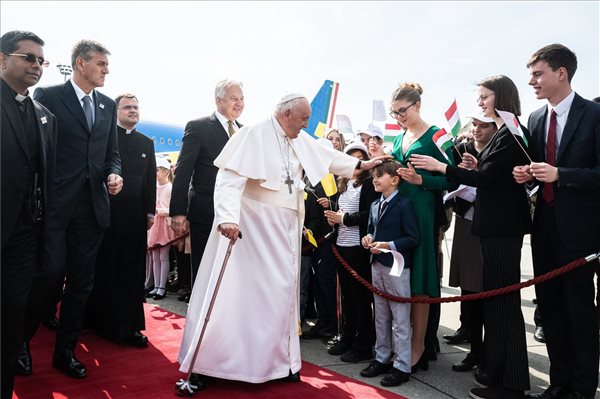The Pope spoke about the nation of historical and religious roots and bridges between peoples, citing his visit to Hungary at the general audience in St. Peter’s Square on Wednesday, where he thanked the authorities, the local church and the Hungarian people for their warm welcome.
Pope Francis stated that three days after his visit to Hungary, he wanted to express his gratitude to everyone who participated in the realization of the journey and accompanied him with their prayers. He mentioned the authorities, the local church and the “brave and rich in memory” Hungarian people. He emphasized that during his stay in Budapest, he felt the love of all Hungarians.
He called roots and bridges the two central symbols of the road. He said that he came as a pilgrim to the Hungarian people, whose history, II. Quoting the words of the first speech of Pope János Pál’s visit to Hungary in 1996, it was defined by saints and heroes, humble and hard-working people.
“It’s true: I saw many simple and hard-working people who proudly keep their ties to their own roots,”
– declared the head of the church.
He believed that the testimonies given at meetings with members of the church and young people showed that the roots are represented above all by the saints: the saints who sacrificed their lives for the people, preached the gospel of love, and gave light in moments of darkness. He added: the saints of the past still help today against discouragement and fear of tomorrow, not forgetting that Christ is our future – Pope Francis quoted the motto of his visit to Hungary.
He explained that the solid Christian roots of the Hungarian people were put to the test, the faith of the Hungarians was put to the test. The twentieth century spoke of atheistic persecutions, of bishops, monks and laity who were murdered or deprived of their freedom.
“But while they tried to cut down the tree of faith, the roots remained intact: a hidden but solid church remained, with secretly ordained priests who witnessed the gospel while working in factories, while grandmothers also evangelized in secret,” Pope Francis said.
He added that communist oppression was preceded by Nazism and the tragedy of the deportation of Jews. “In that horrible genocide, many people stood out in resistance and in protecting the victims, and this was possible because the roots of common coexistence were solid. The bonds of faith and nation thus helped in the return of freedom,” he said.
Deviating from the original text, Pope Francis stated, “We also have a skilled Hungarian poetess in Rome who lived through these trials and tries to convey to young people how necessary it is to fight for ideals so that persecution does not prevail”. The head of the church referred to Edith Bruck, a Holocaust survivor living in Rome, whom the Pope also greeted, as she celebrates her 92nd birthday on Wednesday.
Citing the meetings held with young people at the Papp László Budapest Sports Arena and Pázmány Péter Catholic University, Pope Francis stated that Europe is characterized by the “suppression of the roots”, in which consumption fever acts as an anesthetic, satisfaction with material possessions prevails, in which people forget the past , and float in an individualized present.
“The whole of Europe is in crisis in terms of caring for others, the feeling of community, the beauty of shared dreams and the creation of large families,”
– he stated.
He believed that the importance of building bridges of peace between different peoples was emphasized during the meetings held with the Hungarian authorities. Europe’s mission is to be a peace-builder by accepting differences and welcoming those who knock on its doors, he said.
He called the humanitarian bridge built by Hungary for many Ukrainian refugees beautiful. He expressed his admiration for the Hungarian Church’s wide service of love.
Pope Francis stated that Hungary is also extremely committed to building “bridges to the future”: he mentioned caring for the environment and a sustainable future, as well as building bridges between generations, between the elderly and the young, which is an essential challenge for everyone. He called the meeting with the Greek Catholic Church a bridge, and the fact that believers from different countries and different Christian communities, which work well together in Hungary, took part in the Sunday Mass.
He emphasized: he was touched by the importance of music, which is part of Hungarian culture, during his visit. “There was music everywhere: organ, piano, many instruments and many songs. The young people with disabilities sang, Long live music!, which means long live harmony, long live brotherhood, which gives hope and joy to life,” he emphasized. Pope Francis.
At the end of his speech, he reminded that it is the beginning of May, and Hungarians greatly respect the Mother of God, the Virgin Mary, to whom King St. István offered the country.
“So we entrust this lovely country to the queen of the Hungarians, to the queen of peace we entrust the building of bridges in the world, to the queen of heaven, to whom we pray in this post-Easter period, we entrust our hearts so that they are rooted in the love of God,”
– declared Pope Francis.
MTI/Júlia Sárközy
Photo: MTI/Prime Ministership/Gergely Botár


















